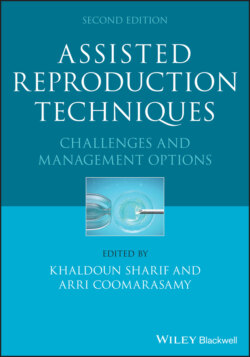Читать книгу Assisted Reproduction Techniques - Группа авторов - Страница 37
Prevention
ОглавлениеClinical outcomes of patients undergoing sperm washing techniques to prevent HIV infection have been good both in terms of disease prevention and pregnancy results. Throughout treatment couples should be encouraged to continue practicing safe sex with condoms. A seroconversion occurred in one woman preparing to undergo ICSI that was secondary to noncompliance with safe sex practices [19]. Since the Centers for Disease Control (CDC) reported in 1990 an alleged HIV infection of a patient following the insemination of processed semen [20], practitioners in the USA and elsewhere have been reluctant to provide assisted reproductive care to HIV‐seropositive patients [21]. However, the increasingly favorable results of clinical studies from both IUI and IVF methods used to prevent infection in HIV‐serodiscordant couples has led to greater acceptance of their clinical utility and safety. The cumulative tally of over 4,000 published cases without a single infection is compelling evidence. Reversal of prohibitions that limited the availability of such services in states such as California are a testament to the willingness of physicians and patient advocacy groups to work together to adopt new guidelines for patient evaluation and treatment [22].
The American College of Obstetricians and Gynecologists (ACOG) and the ASRM have published recommendations for the treatment of virally infected patients embracing a broad policy of nondiscrimination [15,23]. Included are the use of sperm washing techniques for both IUI and IVF. The underlying purpose common to all clinical programs, whether offering IUI or IVF, relates to access to care. Congruent with the basic principles of bioethics, HIV‐seropositive patients should have the opportunity to have a biologic child without causing harm to uninfected partners and their children. As preventive health care measures, IUI and IVF both appear very promising in accomplishing this goal. Although it remains uncertain as to whether one method is superior to the other in this regard, both do appear to be safe and efficacious choices.
Albeit small, all patients undergoing fertility treatments are at theoretical risk of disease transmission. Therefore, it is important to engage them in a frank discussion related to the biology of HIV and inform them that other options, including artificial insemination with donor sperm and adoption also present safe traditional choices. Not all patients will choose sperm washing techniques once they are aware of the infectious risk inherent to all procedures. However, respecting a patient’s right to exercise autonomy and choose to be treated or not is justified since the risk of infection is quite low and the benefit of childbearing so great [24].
